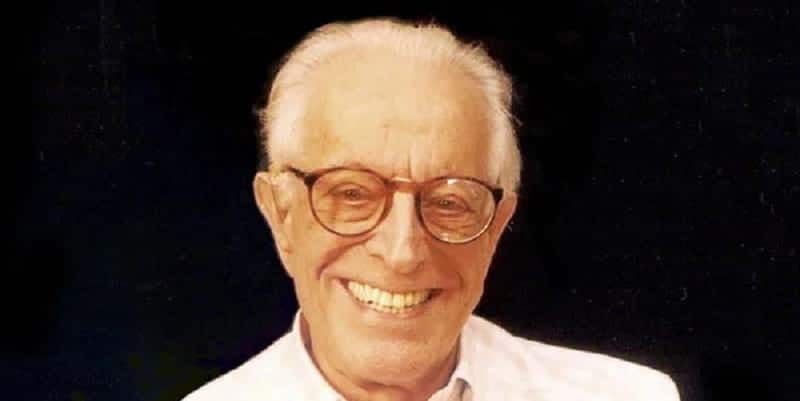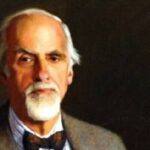Albert Ellis biography and theory

Albert Ellis (September 27, 1913 – July 24, 2007) was an American psychologist and the developer of Rational Emotive Behavior Therapy, which became the basis for today’s cognitive behavioral therapy. Albert Ellis is one of the most influential and successful psychologists after Carl Rogers and Sigmund Freud. In fact, Psychology Today states that no other individual has had as much influence on modern psychotherapy as Ellis. Not even Freud. This article contains his biography, quotes and publications.
Albert Ellis biography
Childhood Albert Ellis
Albert Ellis was born one of three children to a Jewish family in Pittsburgh, Pennsylvania. The family grew up in the Bronx, New York City. His mother Hattie said she suffered from bipolar disorder and his father Harry showed little affection towards his children. Harry was a real estate agent who often traveled and saw his children very sporadically.
Ellis’s parents divorced when he was in his teens.
Ellis suffered from various health problems as a child. In a period of 2 years, he was hospitalized eight times. The longest hospital stay lasted almost a year. Ellis later stated that he learned to deal with his parents’ lack of compassion by developing a great deal of indifference.
During the Great Depression, all the children in the Ellis household tried as best they could to help their parents by working. Even though their parents were emotionally far removed from the children, they had the strength to continue to work and finish school at the same time. In 1934, Ellis received his Bachelor of Arts in Business from the City College of New York Downtown.
After Ellis graduated, he started his own company. The initiative proved unsuccessful and he began to focus more on writing. The writing also did not go smoothly and he decided to go into clinical psychology.
He enrolled in a Ph.D. track at Columbia University’s Teachers College in 1942. At the same time, he began his private practice and a year later completed his Master’s degree in the subject. Even before completing his PhD, he wrote several articles and criticized traditional personality tests. In 1947, he officially completed his Ph.D. in clinical psychology from Columbia University.
In his youth, Ellis had an exaggerated and irrational fear of public speaking and talking to women. He forced himself to talk to 100 different women in The Bronx Botanical Garden. Although he didn’t get a date, he said he became desensitized to the fear of rejection by women.
Professional life
Immediately after receiving his doctorate, Ellis became inspired by the work of Sigmund Freud. He decided to delve into the subject of psychoanalytics and joined New York University as a lecturer. He held a number of important staff positions there.
In the late 1940s, he started working on Rational Emotive Behavioral Therapy. In the years leading up to 1957, Ellis was primarily concerned with teaching new behavioral therapy systems and methods to other therapists. During this period he also developed Rational Therapy. He also developed the ABC model. This model is still used as a method for Cognitive Behavioral Therapy (CBT).
Albert Ellis was deeply involved in the study of erotic relationships. He had an open-minded attitude towards sex and even published one of his most talked-about works on it: Sex without Guilt.
In 1959 he published How to Live with a Neurotic. In this, Ellis further elaborates on Cognitive Behavioral Therapy.
He subsequently founded The Institute for Rational Living, despite the slow adoption of his method. In 1960, he presented an article on his revised approach to the American Psychological Association (APA). Eight years later, the institute was set up as a training institute and psychological center.
Remarkably, during the 1960s, Albert Ellis became a popular figure in the American sexual revolution. In a number of articles he discussed themes such as human sexuality and love. In 1965 he wrote an article on homosexuality: Homosexuality: It’s Causes and Cures. Albert Ellis was accused by many of homophobia, but contradicts this himself in extensive statements.
In the early 1970s, he founded The Living School. During this time he held many important positions in specialized societies, such as the Consulting Psychology, Society for the Scientific Study of Sexuality and the American Academy of Psychotherapists.
In 1994 Albert Ellis revised his book Reason and Emotions in Psychotherapy. In 2008 Rational Emotive Behavior Therapy: It Works for me, It Can Work for You was published. In addition, he started working on his second autobiographical work: All Out!: An Autobiography.
Until the end of his life, Albert Ellis continued to give workshops on mental well-being and psychotherapy. He wrote a total of 80 books and 1.200 articles. He also continued to work hard towards the end of his life. In the years before his death, he still saw ten patients a week. Before that, he helped about 79 patients a week.
Famous Quotes
- “Acceptance is not love. You love a person because he or she has lovable traits, but you accept everybody just because they’re alive and human.”
- “Because when you don’t perform remarkably well the next time, back to slobhood you will go! And even when you do perform well, you will be anxious about not doing so next time. So you had better like your fine performance—but not deify yourself for doing it.”
- “Even injustice has it’s good points. It gives me the challenge of being as happy as I can in an unfair world.”
- “For many years now I have had the quaint idea that all humans-yes, the whole six billion of them on this planet-are out of their fucking minds.”
- “For that again, is what all manner of religion essentially is: childish dependency.”
- “Freud had a gene for inefficiency, and I think I have a gene for efficiency.”
- “I hope to die in the saddle seat.”
- “I thought foolishly that Freudian psychoanalysis was deeper and more intensive than other, more directive forms of therapy, so I was trained in it and practiced it.”
- “If human emotions largely result from thinking, then one may appreciably control one’s feelings by controlling one’s thoughts – or by changing the internalized sentences, or self-talk, with which one largely created the feeling in the first place.”
- “If something is irrational, that means it won’t work. It’s usually unrealistic.”
- “If the Martians ever find out how human beings think, they’ll kill themselves laughing.”
- “If you don’t like something, change it. If you can’t change it, change your attitude.”
- “Life is indeed difficult, partly because of the real difficulties we must overcome in order to survive, and partly because of our own innate desire to always do better, to overcome new challenges, to self-actualize. Happiness is experienced largely in striving towards a goal, not in having attained things, because our nature is always to want to go on to the next endeavor.”
- “Men are not disturbed by things, but by the views which they take of them.”
- “Much of what we call emotion is nothing more or less than a certain kind – a biased, prejudiced, or strongly evaluative kind – of thought.”
- “People don’t just get upset. They contribute to their upsetness.”
- “People got insights into what was bothering them, but they hardly did a damn thing to change.”
- “People have motives and thoughts of which they are unaware.”
- “Rational beliefs bring us closer to getting good results in the real world.”
- “Self-esteem is the greatest sickness known to man or woman because it’s conditional.”
- “Spirit and soul is horseshit of the worst sort. Obviously there are no fairies, no Santa Clauses, no spirits. What there is, is human goals and purposes as noted by sane existentialists. But a lot of transcendentalists are utter screwballs.”
- “Stop shoulding on yourself.”
- “The art of love is largely the art of persistence.”
- “The best years of your life are the ones in which you decide your problems are your own. You do not blame them on your mother, the ecology, or the president. You realize that you control your own destiny.”
- “The best years of your life are the ones in which you decide your problems are your own. You do not blame them on your mother, ecology, or the president. You realize that you control your own destiny.”
- “The concept of deservingness for one’s “sins” implies that certain acts are unquestionably under all conditions “sinful.” And this is impossible to prove.”
- “The emotionally mature individual should completely accept the fact that we live in a world of probability and chance, where there are not, nor probably ever will be, any absolute certainties, and should realize that it is not at all horrible, indeed—such a probabilistic, uncertain world.”
- “There are three musts that hold us back: I must do well. You must treat me well . And the world must be easy.”
- “Too many people are unaware that it is not outer events or circumstances that will create happiness; rather, it is our perception of events and of ourselves that will create, or uncreate, positive emotions.”
- “You mainly make yourself needlessly and neurotically miserable by strongly holding absolutist irrational Beliefs (iBs), especially by rigidly believing unconditional shoulds, oughts, and musts.”
Books and Publications by Albert Ellis
- 2010. The myth of self-esteem: How rational emotive behavior therapy can change your life forever. Prometheus books.
- 2010. Rational emotive behavior therapy: It works for me-it can work for you. Prometheus Books.
- 2009. The road to tolerance: The philosophy of rational emotive behavior therapy. Prometheus Books.
- 2008. Personality theories: Critical perspectives. Sage.
- 2006. Rational emotive behavioral approaches to childhood disorders: Theory, practice and research. Springer Science & Business Media.
- 2004. Why rational emotive behavior therapy is the most comprehensive and effective form of behavior therapy. Journal of Rational-Emotive & Cognitive-Behavior Therapy, 22(2), 85.
- 2003. Early theories and practices of rational emotive behavior therapy and how they have been augmented and revised during the last three decades. Journal of rational-emotive & cognitive-behavior therapy, 21(3-4), 219.
- 2003. Cognitive restructuring of the disputing of irrational beliefs. Cognitive behavior therapy: Applying empirically supported techniques in your practice, 79-83.
- 2002. Overcoming resistance: A rational emotive behavior therapy integrated approach. Springer Publishing Company.
- 2002. The role of irrational beliefs in perfectionism.
- 2001. Rational emotive therapy (pp. 295-348). Guilford, New York.
- 2001. Feeling better, getting better, staying better: Profound self-help therapy for your emotions. Impact Publishers.
- 2001. Counseling and psychotherapy with religious persons: A rational emotive behavior therapy approach. Routledge.
- 2000. Can rational emotive behavior therapy (REBT) be effectively used with people who have devout beliefs in God and religion?. Professional Psychology: Research and Practice, 31(1), 29.
- 1999. How to make yourself happy and remarkably less disturbable. Impact Publishers.
- 1999. Why rational-emotive therapy to rational emotive behavior therapy?. Psychotherapy: Theory, Research, Practice, Training, 36(2), 154.
- 1998. The Albert Ellis reader: A guide to well-being using rational emotive behavior therapy. Citadel Press.
- 1998. Rational emotive behavior therapy: A therapist’s guide. Impact Publishers.
- 1998. How to control your anxiety before it controls you. Citadel Press.
- 1998. How to control your anger before it controls you. Citadel Press.
- 1995. Changing rational-emotive therapy (RET) to rational emotive behavior therapy (REBT). Journal of Rational-Emotive & Cognitive-Behavior Therapy.
- 1994. The sport of avoiding sports and exercise: A rational emotive behavior therapy perspective. The Sport Psychologist, 8(3), 248-261.
- 1993. The advantages and disadvantages of self-help therapy materials. Professional Psychology: Research and Practice, 24(3), 335.
- 1993. Reflections on rational-emotive therapy. Journal of consulting and clinical psychology, 61(2), 199-201.
- 1992. Group rational-emotive and cognitive-behavioral therapy. International journal of group psychotherapy, 42(1), 63-80.
- 1991. The revised ABC’s of rational-emotive therapy (RET). Journal of rational-emotive and cognitive-behavior therapy, 9(3), 139-172.
- 1990. Self-propulsion of asymmetrically vibrating bubbles. Journal of Fluid Mechanics, 212, 65-80.
- 1989. Why some therapies don’t work: The dangers of transpersonal psychology. Prometheus Books.
- 1989. Rational-emotive couples therapy. Pergamon Press.
- 1989. Rational psychotherapy. TACD Journal, 17(1), 67-80.
- 1988. Rational-emotive therapy with alcoholics and substance abusers. Pergamon Press.
- 1987. The practice of rational-emotive therapy (RET). Springer Publishing Co.
- 1987. The impossibility of achieving consistently good mental health. American psychologist, 42(4), 364.
- 1987. A sadly neglected cognitive element in depression. Cognitive Therapy and Research, 11(1), 121-145.
- 1986. Handbook of rational-emotive therapy, Vol. 2. Springer Publishing Company.
- 1986. Rational-emotive therapy applied to relationship therapy. Journal of Rational Emotive Therapy, 4(1), 4-21.
- 1985. Clinical applications of rational-emotive therapy (pp. 1-30). New York: Plenum Press.
- 1985. What is rational-emotive therapy (RET)?. In Clinical applications of rational-emotive therapy (pp. 1-30). Springer, Boston, MA.
- 1985. Expanding the ABCs of rational-emotive therapy. In Cognition and psychotherapy (pp. 313-323). Springer, Boston, MA.
- 1980. Rational-emotive therapy and cognitive behavior therapy: Similarities and differences. Cognitive therapy and research, 4(4), 325-340.
- 1980. Psychotherapy and atheistic values: A response to AE Bergin’s” Psychotherapy and religious values.”.
- 1979. Discomfort anxiety: A new cognitive behavioral construct. Part I. Rational Living, 14(2), 3-8.
- 1977. Rational-emotive therapy: Research data that supports the clinical and personality hypotheses of RET and other modes of cognitive-behavior therapy. The Counseling Psychologist, 7(1), 2-42.
- 1977. Fun as psychotherapy. Rational living.
- 1975. The biological basis of human irrationality.
- 1974. Rational-emotive theory: Albert Ellis.
- 1973. Rational-emotive therapy (pp. 32-44). Big Sur Recordings.
- 1962. Reason and emotion in psychotherapy.
- 1961. On the mechanism of cavitation damage by nonhemispherical cavities collapsing in contact with a solid boundary.
- 1961. A guide to rational living.
- 1960. There is no place for the concept of sin in psychotherapy. Journal of counseling psychology, 7(3), 188.
- 1959. Requisite conditions for basic personality change. Journal of Consulting Psychology, 23(6), 538.
- 1958. Sex without guilt.
- 1957. Rational psychotherapy and individual psychology. Journal of individual psychology, 13(1), 38.
- 1957. Outcome of employing three techniques of psychotherapy. Journal of Clinical Psychology.
- 1957. How to live with a neurotic.
- 1956. The psychology of sex offenders.
- 1955. New approaches to psychotherapy techniques. Journal of Clinical Psychology.
- 1954. The American sexual tragedy.
- 1946. The validity of personality questionnaires. Psychological Bulletin, 43(5), 385.
How to cite this article:
Janse, B. (2022). Albert Ellis. Retrieved [insert date] from Toolshero: https://www.toolshero.com/toolsheroes/albert-ellis/
Published on: 08/26/2022 | Last update: 03/24/2023
Add a link to this page on your website:
<a href=”https://www.toolshero.com/toolsheroes/albert-ellis/”>Toolshero: Albert Ellis</a>











